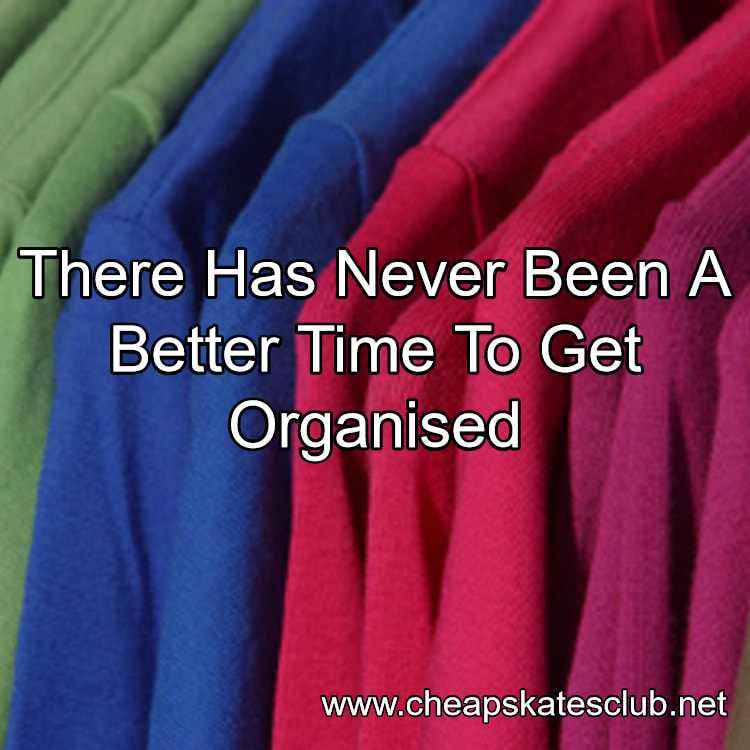Sentry Page Protection
There Has Never Been a Better Time to Get Organised
by Cath 1 September 2020
Organisation is a four-letter word for many people, right up there with budget and saving. It’s viewed as a restrictive life or an unrealistic approach. Yet when you’re organized it actually provides freedom. Organisation can give you more time, money, and peace of mind. The organised life is a simplified life. It allows you to spend more time and energy doing what you love.
There is a perception of an organised life being regimented and controlled, and boringly routine. Not so! Being organised allows you to do the things you need to within a reasonable timeframe, leaving you free to enjoy the rest of your time doing the things you like to do.
There is a perception of an organised life being regimented and controlled, and boringly routine. Not so! Being organised allows you to do the things you need to within a reasonable timeframe, leaving you free to enjoy the rest of your time doing the things you like to do.
What Do You Organise?
There are many areas of your life that can be organised. They include but aren’t limited to your:
* Health goals
* Financial goals
* Daily routine
* Household tasks and goals
* Career goals
* Schedule
* Children’s schedule
* Time
* Hobbies and passions
* Personal documents
* Your space
* Health goals
* Financial goals
* Daily routine
* Household tasks and goals
* Career goals
* Schedule
* Children’s schedule
* Time
* Hobbies and passions
* Personal documents
* Your space
How Do You Organise?
There are different types of organisation for various parts of your life.
For example, you’ll organise your wardrobe differently than the way you’ll organise your personal financial documents or the pantry.
However, most people, believe it or not, have an organisation personality. Take some time to determine how you like to organise things.
Do you prefer labels? I like to use labels and defined areas. To accomplish this I have a labeler (bought during the Officeworks January sale) and use baskets and drawer inserts to keep things sorted and in order.
Are you visual, preferring colour codes and photographs?
Start thinking about how you like to organise before you create a comprehensive system.
For example, you’ll organise your wardrobe differently than the way you’ll organise your personal financial documents or the pantry.
However, most people, believe it or not, have an organisation personality. Take some time to determine how you like to organise things.
Do you prefer labels? I like to use labels and defined areas. To accomplish this I have a labeler (bought during the Officeworks January sale) and use baskets and drawer inserts to keep things sorted and in order.
Are you visual, preferring colour codes and photographs?
Start thinking about how you like to organise before you create a comprehensive system.
Make a Commitment
Make a list of the areas of your life that you want or need to organise. Prioritise those areas so that the most important area is listed first.
Make a commitment now to start checking items off of that list. Create a date that you want to have an area organised by and a plan to achieve it. For example, maybe you have organise your personal documents listed first. Decide when you’re going to have that organisation accomplished and what you need to do to make it happen.
Then just do it!
Make a commitment now to start checking items off of that list. Create a date that you want to have an area organised by and a plan to achieve it. For example, maybe you have organise your personal documents listed first. Decide when you’re going to have that organisation accomplished and what you need to do to make it happen.
Then just do it!
Follow Through
Organising something is only the first step. The next, and most important step, is to follow through on your organisation system and to sustain it.
For example, if you spend an entire weekend organising your wardrobe but then you just throw your clothes into the cupboard any which way, you’ve wasted a weekend. Commit to following through on your organisation system. Hang things up as soon as you take them off, put clean laundry away as soon as it comes off the line, make sure washing is put in the laundry basket every day.
If you are unable to follow through, figure out why. Chances are the organisation system you created doesn’t fit your needs or personality, so change it.
For example, if you spend an entire weekend organising your wardrobe but then you just throw your clothes into the cupboard any which way, you’ve wasted a weekend. Commit to following through on your organisation system. Hang things up as soon as you take them off, put clean laundry away as soon as it comes off the line, make sure washing is put in the laundry basket every day.
If you are unable to follow through, figure out why. Chances are the organisation system you created doesn’t fit your needs or personality, so change it.
Use Organisation Tools
One of the best ways to create an organisation system is to use handy organisation tools. Mind maps and checklists are easy to use and quite effective. You can use mind mapping to brainstorm and plan your organisation systems. Checklists can be created to make sure you don’t miss a step. In fact, there are lots of useful organisation checklists that you can download from the printables page; checklists that help you take charge of organising your finances, managing your time, even cleaning your wardrobe.
